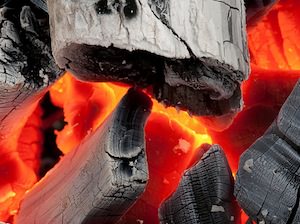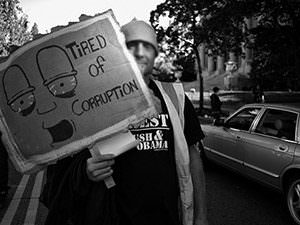Some Labor Day Observations: Where Will the Fight Go From Here?
As the nation faces a continued and massive gap between the haves and the have-nots, we listen to some different voices and observations about where organized labor is, and where it might be headed.
Blood was shed to make this holiday, Labor Day, happen, a crucial detail that most tend to ignore amid the barbecues, lamentations over the end of summer, and sales (and there’s a rich irony in American shoppers flocking to malls on this day for deals on sweatshop-made goods). But the cold hard reality is that respect for labor pretty much ends at the holiday — and even then it’s pretty tepid.
As Paul Krugman noted in The New York Times on Sunday, “there are evidently a lot of wealthy people in America who consider anyone who isn’t wealthy a loser — an attitude that has clearly gotten stronger as the gap between the 1 percent and everyone else has widened. And such people have a lot of friends in Washington.”
But there’s also a generational divide. Vickie Elmer reports at Quartz that young American union membership is declining at twice the rate of other age groups, dropping 26 percent from 2002 to 2012.
[T]he sectors that are most likely to be unionized—government workers, teachers and library jobs—may not appeal to 20-somethings. Young workers are more likely to land a job in technology or with a smaller company or in retail and restaurants, none of which has many unions, says Michelle Kaminski, an associate professor at Michigan State University who teaches labor courses.
Many of her undergraduate students are “young, bright and ambitious,” and expect their future employers will treat them well, she said. They see no reason they’d need a union, though that perspective could change after they experience workplace issues or unfair treatment, she added.
“Young workers move around from job to job a lot,” and don’t see themselves as connected to their job or employer, Kaminski said. The bottom line: Last year, only 4.2 % of the youngest workers were union members, compared to 11.3% of all US workers and almost 15% of workers ages 55 to 64.
There is a cost tied to all of this. Elsewhere on Quartz, a set of graphics shows wages as a percent of gross domestic product are lower than at any time since 1947, while corporate profits as a percentage of GDP are at their highest since 1980, the first year included in the chart. In fact, the Great Recession was just a temporary derailment in what has been a relentlessly higher march for corporate profits.
And for corporate leaders, despite rampant incompetence. The Institute for Policy Studies reported recently that nearly 40 percent of the highest paid CEOs — presumably the best and the brightest of the business world — eventually were bounced from their jobs.
The lavishly compensated CEOs we spotlight here should be exemplars of value-added performance. After all, sky-high CEO pay purportedly reflects the superior value that elite chief executives add to their enterprises and the broader U.S. economy.
But our analysis reveals widespread poor performance within America’s elite CEO circles. Chief executives performing poorly — and blatantly so — have consistently populated the ranks of our nation’s top-paid CEOs over the last two decades.
The report’s key finding: nearly 40 percent of the CEOs on these highest-paid lists were eventually “bailed out, booted, or busted.”
Truthdig reported Sunday on the anomaly that the current wave of anti-union laws coursing through Republican-led state legislatures could be setting the stage for a revival of local and grass-roots labor fights, a subject that labor journalist Mike Elk told Salon could be the key to upending labor stagnation and the bureaucratization of unions. Elk traveled with the Summer of Solidarity, a national tour of labor activists that ends Monday with a march near the Los Angeles-Long Beach shipping ports.
I see in a lot of labor organizations a lot of bureaucracy, and all you see is staff representatives interacting with workers from one location, and you don’t see rank and file workers getting together from across locations and sharing ideas. And that’s really what we’re going to need because, as anybody who’s spent a lot of time around union bureaucracies knows, they can very quickly become intellectually stagnant, they can very quickly become places where people are just going through the motions, whereas rank-and-file workers have much more at stake since it’s literally their jobs. I mean if workers get their pay cut, that doesn’t mean that union staffers’ salaries go down. So I think rank-and-file workers really need to be back in the driver’s seat, and I think maybe this tour could be part of that sort of process of many workers who wish they were more back in the driver’s seat.
But in an environment in which corporations control the roads, it may not matter who’s in the driver’s seat.
You know, I don’t know where labor’s going. I don’t think anybody does. Obviously, labor’s fighting back in more militant ways than they have in the past, but they’re also under greater attack. It’s unclear where things are headed, but it’s definitely at a tipping point in some ways. Whether or not labor stands up and fights and is able to resist these changes or whether they don’t. It’s going to be uneven in different places. So I don’t know. All I know is that employers are more emboldened to go on the attack than they’ve ever been in the past, and that’s a difficult situation for any worker to deal with. And it’s an opportunity. Maybe it forces workers to rise to more militant sort of status, maybe it radicalizes people. It’s unclear.
Some things to think about as you fire up the grill and crack open a beer. A toast might be in order to the workers killed fighting for the working conditions — including this weekend off — that most people take for granted. But better still is to recognize that the struggle for workers’ rights could be killed not by corporate-driven campaigns and toothless labor laws, but by apathy. And with some 27 percent of Americans unemployed or underemployed, that apathy is hard to understand.
—Posted by Scott Martelle.
Your support matters…Independent journalism is under threat and overshadowed by heavily funded mainstream media.
You can help level the playing field. Become a member.
Your tax-deductible contribution keeps us digging beneath the headlines to give you thought-provoking, investigative reporting and analysis that unearths what's really happening- without compromise.
Give today to support our courageous, independent journalists.







You need to be a supporter to comment.
There are currently no responses to this article.
Be the first to respond.